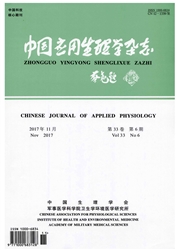

 中文摘要:
中文摘要:
目的:本研究应用胶原诱导性关节炎(CIA)的动物模型,通过研究CD4+T细胞亚群表达酪氨酸羟化酶(TH)的变化与作用,探讨CIM+T细胞亚群来源的儿茶酚胺与CIA的炎症反应之间的关系。方法:雄性DBA/1小鼠36只随机分为对照组、35天模型组和55天模型组(n=12)。用Ⅱ型胶原(cⅡ)乳剂免疫DBA/1小鼠诱导CIA,在初次免疫后第35天和55天进行关节临床评分并检测血清中抗cⅡ IgG抗体水平的变化。用Western blot法检测肠系膜淋巴结中1h1、Th17、Th2和Treg细胞的特异性转录因子及其细胞因子以及TH表达的变化。用流式细胞术检测肠系膜淋巴结中表达TH的CD4+T细胞亚群数目的变化。结果:CIA小鼠在发病早期(初次免疫后第35天)和发病晚期(初次免疫后第55天)临床评分和血清中抗cⅡ IgG抗体水平显著升高。CIA小鼠肠系膜淋巴结中1h1和Th17细胞的特异性转录因子和细胞因子表达增加而Th2和Treg细胞的细胞因子表达减少。CIA小鼠肠系膜淋巴结中TH的表达增加,且CD4+T细胞中TH+的细胞数目增多,这主要是来自CD4+T细胞亚群中Thl和rIh17细胞的作用。结论:CIA小鼠肠系膜淋巴结中存在CIM+T细胞亚群来源的儿茶酚胺的增加,可能在cn的发展过程中具有一定的抗炎作用。
 英文摘要:
英文摘要:
Objective: We used an animal model of collagen-induced arthritis (CIA) to study changes and roles of tyrosine hydroxylase (TH) expressed by CIM+ T cell subsets, and then explore the relationship between CIM+ T cell subset-derived catecholamines and inflamma- tory responses in CIA. Methods: Thirty-six male DBA/1 mice were randomly divided into control group, CIA model group (day 35) and CIA model group (day 55) ( n = 12). CIA model was induced by type lI collagen (CII) in DBA/1 mice. On the 35th and 55th day following prima- ry immunization, the joints of the mice were observed for clinical score of swelling and the level of anti-ClI IgG antibody in serum was exam- ined. Expression of specific transcription factors and cytokines of th1, Th17, Th2 and Treg cells and TH in mesenteric lymph nodes was mea- sured by means of Western blot. The changes of TH expressed by CD4+ T cell subsets in mesenteric lymph nodes were determined by flow cy- tometry. Results: Clinical score and anti-CII antibody level increased in CIA compared with that in intact mice. Specific transcription factors and cytokines expressed by Thl and Thl7 cells were upregulated and cytokines expressed by Th2 and Treg cells were downregulated in mesen- teric lymph nodes in CIA mice. Expression of TH was upregulated and the increased expression of TH in CD4+ ceils was attributed to Thl and Thl7 cells in mesenteric lymph nodes of CIA. Conclusion: The increase in catecholamines from CD4+ T cell subsets in mesenteric lymph nodes of CIA may be related to inflammatory alleviation in CIA progression.
 同期刊论文项目
同期刊论文项目
 同项目期刊论文
同项目期刊论文
 期刊信息
期刊信息
